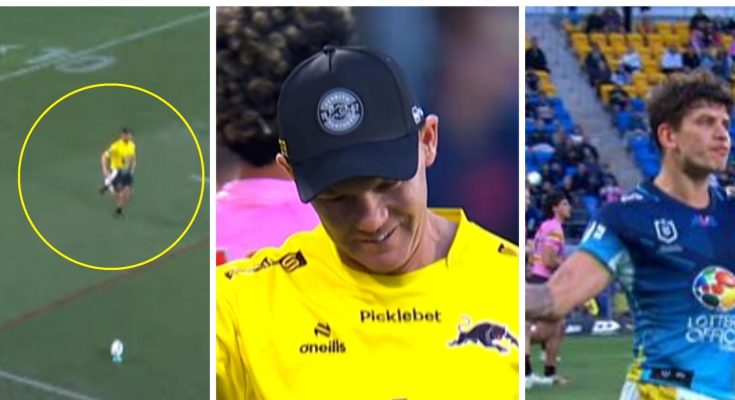In what has rapidly become one of the most talked-about moments of the NRL season, a firestorm of controversy has engulfed the Penrith Panthers after a club trainer halted play during a pivotal moment in their clash with the Gold Coast Titans. Described by many as “disgraceful interference,” the incident has sparked outrage from fans, pundits, and even former players, with sanctions reportedly imminent. The fallout has sent shockwaves through the rugby league community, threatening to taint the Panthers’ legacy and ignite further scrutiny on the growing influence of off-field personnel.
The incident occurred late in the second half of the tense match, with the scoreboard finely balanced and the Titans mounting a promising attacking raid deep inside Penrith’s territory. As Gold Coast’s momentum surged and the play intensified near the Panthers’ defensive line, the game was suddenly and unexpectedly halted by the on-field referee following advice from a Penrith trainer who had called for medical attention to a player situated well behind the play. The timing couldn’t have been more suspicious.
With the Titans pressing hard and a potential game-changing try on the horizon, the halt in play disrupted their flow, cooled their momentum, and allowed the Panthers’ defensive line to regroup. The result? The Titans’ attacking sequence fizzled out, Penrith regained composure, and ultimately escaped with a narrow win. But it wasn’t the scoreboard that became the talking point—it was the trainer’s intervention and the suspicious circumstances under which it occurred.
Video replays and commentary scrutiny quickly zeroed in on the event. The player in question, while indeed down, was not in the immediate vicinity of the play. More damning, the match officials had not been informed of a serious injury through the usual channels until the moment the Titans appeared poised to score. The outcry was swift. Critics labeled the decision to halt the game as not only unnecessary but potentially a deliberate act designed to manipulate the course of play—a line that should never be crossed in professional sport.
The NRL launched an immediate review of the incident. Within 48 hours, the governing body confirmed that Penrith would be fined $50,000, and the trainer involved—Corey Bocking—would be banned for five matches. It was a damning verdict. The league found that the trainer’s actions were “unjustified” and “had an unacceptable impact on the natural flow of the game.” While trainers are permitted to alert referees to serious injuries, the NRL emphasized that this authority must be exercised with integrity, impartiality, and only when necessary.
Penrith’s response to the sanctions was predictably measured. Head coach Ivan Cleary expressed disappointment over the outcome but stopped short of directly criticizing the NRL’s ruling. “We respect the integrity of the game and accept the ruling handed down,” he said. “At the same time, we back our staff and believe there was no ill intent.” But Cleary’s attempt to play both sides failed to quell public anger, and in some circles, even drew more criticism for lacking accountability.
For a club that has enjoyed unparalleled dominance in recent seasons—claiming back-to-back premierships and becoming a benchmark for consistency and excellence—the controversy couldn’t have come at a worse time. With the finals looming and injuries mounting, Penrith has found itself not only battling on the field but also defending its reputation off it. What should have been a routine victory is now mired in allegations of underhanded tactics and unsportsmanlike behavior.
Social media lit up in the aftermath. Former NRL players and commentators didn’t hold back. “That’s not gamesmanship, that’s cheating,” one prominent former captain tweeted. “You can’t just stop the game when it suits you.” Others demanded stronger consequences, with calls for competition points to be deducted or for stricter guidelines around trainer involvement during live play.
The situation has reignited a broader debate in rugby league circles about the role of trainers and the growing trend of their influence over live match situations. While player welfare is paramount, there’s a fine line between protecting athletes and manipulating game dynamics. In recent years, the NRL has attempted to clamp down on unnecessary stoppages, but this latest incident highlights how easily loopholes can be exploited when high-stakes outcomes hang in the balance.
What makes this particular incident even more damaging is the fact that it wasn’t an isolated occurrence in the sport. Over the past two seasons, there have been multiple cases where trainers were accused of interfering with play or exaggerating injury concerns to gain a tactical advantage. While most were deemed within bounds, the pattern has drawn increasing scrutiny from fans and the media alike. Now, with Penrith at the center of the storm, the league is under pressure to implement sweeping reforms to protect the integrity of its competition.
Suggestions have already begun circulating—ranging from limiting trainers’ on-field access to implementing third-party medical assessments during games. Some are even pushing for independent injury spotters, similar to those used in the NFL, who can assess and communicate player welfare needs without the involvement of club-affiliated staff. It’s clear that the NRL must act swiftly if it hopes to restore faith in the fairness of its matches.
In Penrith’s dressing room, the mood is reportedly tense. While players remain focused on the path ahead, the trainer ban and the financial penalty have created unwanted distractions. Insiders suggest that some within the club are privately furious that a preventable incident has attracted such negative attention. It is also understood that Corey Bocking is struggling mentally in the wake of his suspension, with coach Cleary acknowledging the toll this ordeal has taken on him. “It’s been a tough week for Corey,” Cleary said. “He’s been doing this a long time, and it’s hard to see him hurting.”
That emotional strain is likely to persist. Five weeks is a significant period in a tightly packed NRL season. The absence of a key trainer disrupts routines, forces staffing reshuffles, and undermines the confidence of players who depend on the familiarity and guidance of long-time support personnel. More critically, it underscores how seemingly minor decisions from off-field staff can ripple through an entire club and beyond.
As for the Titans, their camp has remained largely silent, choosing not to fuel the fire. However, sources close to the club suggest that internal frustration is running high. To have a scoring opportunity robbed by what many consider an illegitimate stoppage has understandably left a bitter taste. While they’ve opted for professionalism publicly, there’s little doubt that the incident will serve as motivation when the two teams meet again.
This latest controversy leaves the NRL at a crossroads. The league must decide whether this was an isolated case of poor judgment or a symptom of a wider problem that requires structural change. For the fans, particularly those of the Titans, no sanction or statement can undo the disruption of that moment or the possible impact it had on the outcome of the game. What remains is a growing cynicism and a loss of trust that must be urgently addressed.
In the high-stakes world of modern rugby league, where margins between victory and defeat are razor-thin, every decision counts. When off-field personnel begin influencing those margins, whether intentionally or otherwise, the consequences can be seismic. Penrith, once the darlings of the league, now find themselves fighting not just for another premiership, but to protect their integrity. Whether they can emerge from this saga unscathed remains to be seen, but one thing is certain—the game will never look at trainer interventions the same way again.



